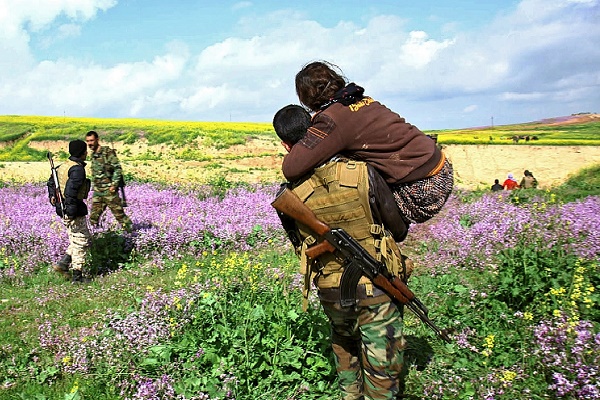
Last week the New York Times published an article that revealed in gruesome detail what life is really like for women under Islamic State rule. A medieval, barbaric regime where females are forbidden to leave the house without a close male relative; where the strictest dress code is violently enforced (even eyes must be invisible); where her voice must not be raised; where stoning is the punishment for adultery.
That’s for those “lucky” enough to be one of four million Muslims living under Islamic State controlled territory. For women of the Yazidi religion – a minority that Islamic State see as infidels – it is far worse. Following the invasion of villages on the edges of Mount Sinjar last year, around 3,000 were captured and hauled away, eventually to be bought and sold for sex in markets. It was largest single kidnap of women this century.
This barbarism is being glossed over with a theological justification. Islamic State’s “Research and Fatwa Department” has been explicit in what can be done to the Yazidi women, who are considered slaves. A theology of rape has been instituted, which Islamic State claims brings the men “closer to God”: “It is permissible to have intercourse with the female slave who hasn’t reached puberty, if she is fit for intercourse.’
It’s more than just the execution of one of the oldest tactics of war, designed to lure fighters and terrorise the enemy. It’s become “a persistent infrastructure”, a bureaucracy of evil that banalises the suffering – we’ve seen this in almost every dictatorship that's ever existed – which functions through networks of warehouses, viewing rooms, dedicated buses, ledgers, sales contracts, notaries.
Every month new horrors come to light, often from the fortunate few women that have managed to escape. It’s easy sometimes to read these stories, and imagine them to be just that: so distant from our daily lives as to be more like movie scenes.
But they aren't of course, and in a new Dispatches documentary, Escape From ISIS, we actually see and hear from those that have been through it. Filmed and directed by Edward Watts, Escape From ISIS tracks efforts to rescue Yazidi women from this living hell – and interviews those that made it out. It adds the difficult but necessary visual and human layer.
One has a seizure as she tells the story of what happened to her: it was her fifth of the day. A family member who explains she has ten relatives currently being held. A teen describes being raped multiple times. Another who explains matter-of-factly how ‘we were coming up with ways to kill ourselves’.
Difficult as it is to watch, these are vital stories for us in the UK to learn. Because while these people are risking their lives trying to rescue women wanting to leave, others are risking their lives to get in. There are believed to be approximately 500 Western Muslim women currently living in Islamic State controlled land, most infamously the three teenage girls from Bethnal Green: Shamima Begum, Kadiza Sultana and Amira Abase. Why exactly young Western Muslims might decide to up and leave to join a barbarous, racist, murderous, fanatical group like Islamic State has many people confused.
I’ve written several reports about what drives people to these extremes. One thing that always comes out – whether it’s men or women – is appeal of the anti-establishment, and the idea of being part of something. An emotional urge to create a paradise, a modern religious utopia, which I think is a more powerful draw than any niche religious interpretation. Islamic State propagandists know this well of course. According to a recent report by the Institute for Strategic Dialogue and the International Centre for the Study of Radicalisation at King's College London, Islamic State's caliphate is “presented as a utopian society, while also providing those sensations of adventure, belonging and sisterhood.”
Escaping Islamic State exposes the enormous gulf between the reality and propaganda. This is a murderous regime in which Muslims are slaughtered, and men like Alan Henning who go to help Syrian children are executed in cold blood. As the women and girls are treated worse than cattle, the men sit around laughing and joking about buying their Yazidi girls. Do you want a slave? Haha. Can you handle her? Haha. The price will be different if she has blue eyes.
The UK, which those who left thought was a disgusting Islamophobic, decadent, and immoral society begins to look like the paradise they were looking for; and the utopia in which they are trapped turns out to be one of the most brutal regimes for women the world has ever known.